完成句子中的“情态动词+have,done”
情态动词+have done的用法

A
【解析】答案为A。这是疑问句,所以排除B选项, 解析】答案为A 这是疑问句,所以排除B选项, 另外,should done意为 本应该…”,所 意为“ 另外,should have done意为“本应该 , 以排除,would done表示虚拟语气 表示虚拟语气, 以排除,would have done表示虚拟语气,所以 也排除, 的意思为“我可能把它放哪呢? 也排除,A的意思为“我可能把它放哪呢?”
B
done用于肯定句和否定句 用于肯定句和否定句, 【解析】may+ have done用于肯定句和否定句, 解析】 表示对过去情况发生的可能性的不确定推测, 表示对过去情况发生的可能性的不确定推测, 意为“可能/也许已经…了 可能/ 意为“可能/也许已经 了”或“可能/也许 还没有…”. “我们或许还没有证明是伟大的探 还没有 . 我们或许还没有证明是伟大的探 险者,但我们已取得了在过去的10 10年里的最伟 险者,但我们已取得了在过去的10年里的最伟 大的进展 ”。
14. ---Catherine,I have cleaned the room , for you. . —Thanks.You _______ have done it. I . could manage it myself. . A.wouldn’t B.couldn’t . . C.shouldn’t D.needn’t . .
7. I ______ have ben more than six years old when the accident happened.(2005天津 天津) . 天津 A.couldn’t B.mustn’t . . C.shouldn’t D.wouldn’t . .
A
情态动词have_done

情态动词+have+done是历年高考的重点和难点之一,现将其用法总结归纳如下:一、must+have+done表示对过去事情的肯定推测,译成“一定做过某事”,该结构只用于肯定句.1. It must have rained last night, for the ground is wet. 昨晚一定下雨了,因为地面还是湿的2. You must have been mad to speak to the servant.你和仆人说话,一定是发疯了二、“can't+have+done”表示对过去事情的否定推测,译成“不可能做过某事”。
1. Mr. Smith can't have gone to Beijing, for I saw him in the library just now. 史密斯先生不可能去北京了,我刚才还在图书馆见过他。
2.Mary can't have stolen your money. She has gone home.玛丽不可能偷你的钱,她回家去了三、“can+have+done”表示对过去行为的怀疑,用于疑问句,译成“可能做过……吗?”。
1.There is no light in the room. Can they have gone out?屋里没有灯,他们可能出去了吗?2. There is nowhere to find them. Where can they have gone? 到处找不到他们,他们可能到什么地方去呢?四、could+have+done’是虚拟语气,表示对过去事情的假设,意思是本来能够做某事而没有做.He could have passed the exam, but he was too careless.本来他能通过考试,但他太粗心五、“may+have+done”表示对发生过的事情的推测,意思是“可能已经”或“也许已经”,用于肯定句中。
高一B2U1-2情态动词+have_done_结构

高一英语B2U1-2 情态动词+have+doneI.对过去的推测一、“must+have+done”表示对过去事情的肯定推测,译成“一定做过某事”,只用于肯定句。
It must have rained last night, for the ground is wet. 昨晚一定下雨了,因为地面还是湿的。
二、“can't+have+done”表示对过去事情的否定推测,译成“不可能做过某事”,只用于否定句。
Mr. Smith can't have gone to Beijing, for I saw him in the library just now.史密斯先生不可能去北京了,我刚才还在图书馆见过他。
三、“can+have+done”表示对过去行为的怀疑,用于疑问句,译成“可能做过……吗?”。
There is nowhere to find them. Where can they have gone?到处找不到他们,他们可能到什么地方去呢?四、“may+have+done”表示对发生过的事情的推测,是“可能已经”或“也许已经”,用于肯定句中。
—What has happened to George? —I don't know. He may have got lost.—乔治发生了什么事?—我不知道,他可能迷路了。
五、“might+have+done”表示对过去事情的推测,might与may意思相同,但可能性更小。
He might have given you more help, even though he was busy.他或许会多给你一些帮助,即使他很忙。
II.对过去事实进行相反的假设六、“could+have+done”是虚拟语气,表示对过去事情的假设,意思是本来能够做某事而没有做。
He could have passed the exam, but he was too careless. 本来他能够通过考试,但是他太粗心。
情态动词+have done的构成及用法含译文
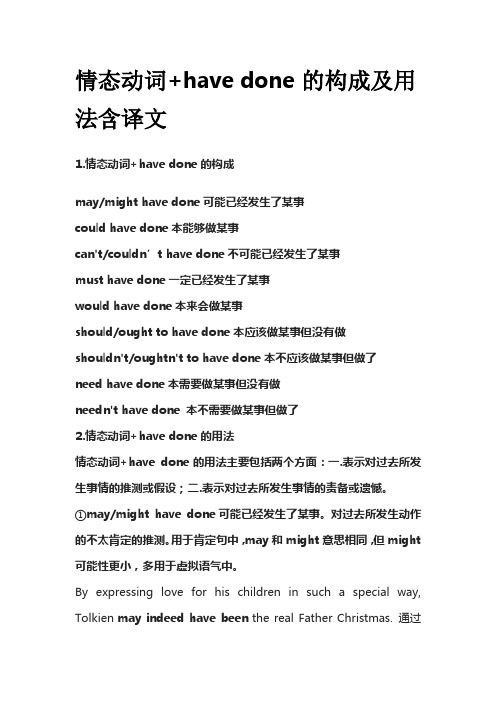
情态动词+have done的构成及用法含译文1.情态动词+have done的构成may/might have done可能已经发生了某事could have done本能够做某事can't/couldn’t have done不可能已经发生了某事must have done一定已经发生了某事would have done本来会做某事should/ought to have done本应该做某事但没有做shouldn't/oughtn't to have done本不应该做某事但做了need have done本需要做某事但没有做needn't have done 本不需要做某事但做了2.情态动词+have done的用法情态动词+have done的用法主要包括两个方面:一.表示对过去所发生事情的推测或假设;二.表示对过去所发生事情的责备或遗憾。
①may/might have done可能已经发生了某事。
对过去所发生动作的不太肯定的推测。
用于肯定句中,may和might意思相同,但might 可能性更小,多用于虚拟语气中。
By expressing love for his children in such a special way, Tolkien may indeed have been the real Father Christmas. 通过这种特别的方式表达对孩子们的爱,托尔金可能真的是真正的圣诞老人。
(新外研版必修二)You can check his office. He might have been there already. 你可以去他的办公室看看。
他可能已经到那儿了。
If he had been given more encouragement, he might have made greater progress. 如果给他更多的鼓励,他可能会取得更大的进步。
情态动词+havedone
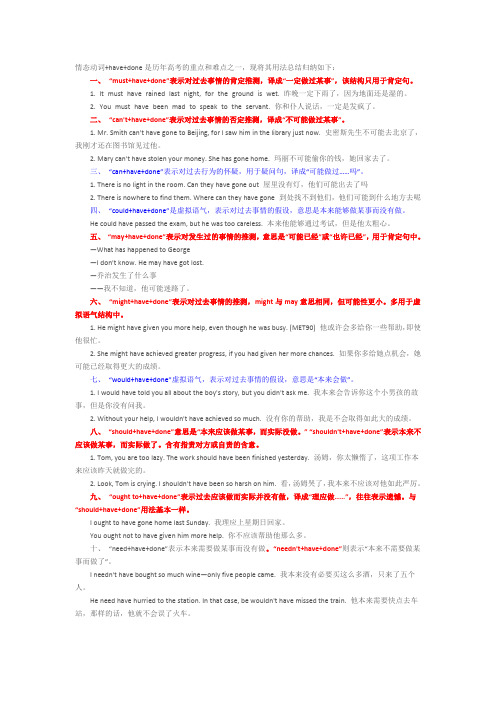
情态动词+have+done是历年高考的重点和难点之一,现将其用法总结归纳如下:一、“must+have+done”表示对过去事情的肯定推测,译成“一定做过某事”,该结构只用于肯定句。
1. It must have rained last night, for the ground is wet. 昨晚一定下雨了,因为地面还是湿的。
2. You must have been mad to speak to the servant. 你和仆人说话,一定是发疯了。
二、“can't+have+done”表示对过去事情的否定推测,译成“不可能做过某事”。
1. Mr. Smith can't have gone to Beijing, for I saw him in the library just now. 史密斯先生不可能去北京了,我刚才还在图书馆见过他。
2. Mary can't have stolen your money. She has gone home. 玛丽不可能偷你的钱,她回家去了。
三、“can+have+done”表示对过去行为的怀疑,用于疑问句,译成“可能做过……吗”。
1. There is no light in the room. Can they have gone out 屋里没有灯,他们可能出去了吗2. There is nowhere to find them. Where can they have gone 到处找不到他们,他们可能到什么地方去呢四、“could+have+done”是虚拟语气,表示对过去事情的假设,意思是本来能够做某事而没有做。
He could have passed the exam, but he was too careless. 本来他能够通过考试,但是他太粗心。
五、“may+have+done”表示对发生过的事情的推测,意思是“可能已经”或“也许已经”,用于肯定句中。
“情态动词+have_done”重点讲解

1. Sorry, I’m late. I ____ have turned off the alarm clock and gone back to sleep again.( 2000春) A. might C. can B. should D. will
根据They were already five people in the car, but they managed to take me as well.一句中的时态,应该是对过去情况的推测 判断,因为车上已经有5位人了,在带上我一个,可以断定 这一定是一次不舒适的旅行。所以,本句表达的是对过去 否定的推测判断,应该用can’t/ could have done来表达。故 答案选D。
--- Catherine, I have cleaned the room for you. --- Thanks. you ___ it. I could manage it myself. ( 05福建 31题) A. needn’t do C. mustn’t do B. needn’t have done D. shouldn’t have done
2. My sister met him at the Grand Theatre yesterday, so he ____ your lecture. (2002 上海) A. couldn’t have attended B. needn’t have attended C. mustn’t have attended D. shouldn’t have attended
最新情态动词+have-done总结
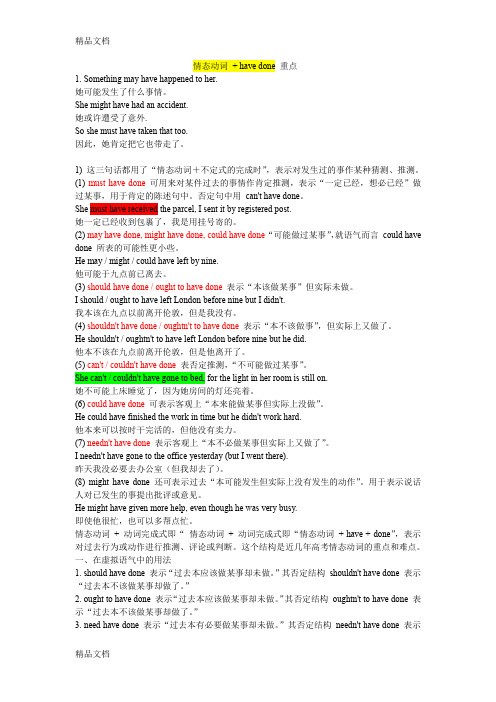
情态动词+ have done 重点1. Something may have happened to her.她可能发生了什么事情。
She might have had an accident.她或许遭受了意外.So she must have taken that too.因此,她肯定把它也带走了。
1) 这三句话都用了“情态动词+不定式的完成时”,表示对发生过的事作某种猜测、推测。
(1) must have done 可用来对某件过去的事情作肯定推测,表示“一定已经,想必已经”做过某事,用于肯定的陈述句中。
否定句中用can't have done。
She must have received the parcel, I sent it by registered post.她一定已经收到包裹了,我是用挂号寄的。
(2) may have done, might have done, could have done “可能做过某事”,就语气而言could have done 所表的可能性更小些。
He may / might / could have left by nine.他可能于九点前已离去。
(3) should have done / ought to have done表示“本该做某事”但实际未做。
I should / ought to have left London before nine but I didn't.我本该在九点以前离开伦敦,但是我没有。
(4) shouldn't have done / oughtn't to have done 表示“本不该做事”,但实际上又做了。
He shouldn't / oughtn't to have left London before nine but he did.他本不该在九点前离开伦敦,但是他离开了。
高考“情态动词+have_done”考点解析
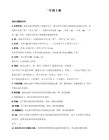
2、根据句意“我妹妹昨天在大剧院见过他”,所以,一定是对过去已经发生的否定的判断,答案选A。
3、本句表达的是对过去发生过的情况的疑问,所以应该用could have done,答案选C。
It must have rained last night, for the ground is wet this morning.
昨天晚上一定是下雨了,因为今晨地面是潮湿的。
She didn’t attend the lesson yesterday. She must have been ill.
A. should B. must C. could D. would
4. I didn’t see her in the meeting-room this morning. She ____ at the meeting. (1995 上海)
A. mustn’t have spoken B. shouldn’t have spoken
A. might B. should C. can D. will
2. The window was broken. Tom ____ have done that, for he was a little naughty.
A. could B. might C. should D. ought to
--- It ___ a comfortable journey. (MET95)
A. can’t be B. shouldn’t be C. mustn’t have been D. couldn’t have been
2. My sister met him at the Grand Theatre yesterday, so he ____ your lecture. (2002 上海)
情态动词+have done
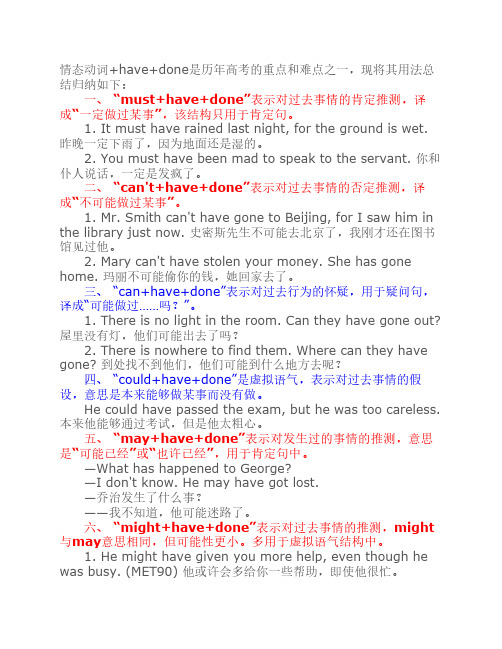
情态动词+have+done是历年高考的重点和难点之一,现将其用法总结归纳如下: 一、 “must+have+done”表示对过去事情的肯定推测,译成“一定做过某事”,该结构只用于肯定句。
1. It must have rained last night, for the ground is wet.昨晚一定下雨了,因为地面还是湿的。
2. You must have been mad to speak to the servant. 你和仆人说话,一定是发疯了。
二、 “can't+have+done”表示对过去事情的否定推测,译成“不可能做过某事”。
1. Mr. Smith can't have gone to Beijing, for I saw him in the library just now. 史密斯先生不可能去北京了,我刚才还在图书馆见过他。
2. Mary can't have stolen your money. She has gone home. 玛丽不可能偷你的钱,她回家去了。
三、 “can+have+done”表示对过去行为的怀疑,用于疑问句,译成“可能做过……吗?”。
1. There is no light in the room. Can they have gone out?屋里没有灯,他们可能出去了吗? 2. There is nowhere to find them. Where can they have gone? 到处找不到他们,他们可能到什么地方去呢? 四、 “could+have+done”是虚拟语气,表示对过去事情的假设,意思是本来能够做某事而没有做。
He could have passed the exam, but he was too careless.本来他能够通过考试,但是他太粗心。
五、 “may+have+done”表示对发生过的事情的推测,意思是“可能已经”或“也许已经”,用于肯定句中。
情态动词+have-done用法
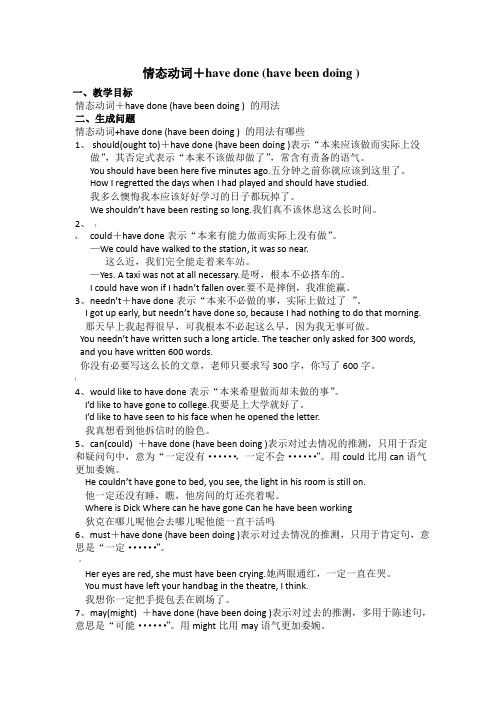
情态动词+have done (have been doing )一、教学目标情态动词+have done (have been doing ) 的用法二、生成问题情态动词+have done (have been doing ) 的用法有哪些1、should(ought to)+have done (have been doing )表示“本来应该做而实际上没做”,其否定式表示“本来不该做却做了”,常含有责备的语气。
You should have been here five minutes ago.五分钟之前你就应该到这里了。
How I regretted the days when I had played and should have studied.我多么懊悔我本应该好好学习的日子都玩掉了。
We shouldn’t have been resting so long.我们真不该休息这么长时间。
2、《3、could+have done表示“本来有能力做而实际上没有做”。
—We could have walked to the station, it was so near.这么近,我们完全能走着来车站。
—Yes. A taxi was not at all necessary.是呀,根本不必搭车的。
I could have won if I hadn’t fallen over.要不是摔倒,我准能赢。
3、needn’t+have done表示“本来不必做的事,实际上做过了”。
I got up early, but needn’t have done so, because I had nothing to do that morning.那天早上我起得很早,可我根本不必起这么早,因为我无事可做。
You needn’t have written such a long article. The teacher only asked for 300 words, and you have written 600 words.你没有必要写这么长的文章,老师只要求写300字,你写了600字。
情态动词+havedone用法总结

情态动词+ have done的用法总结一、“must+have+done”表示对过去事情的肯定推测,译成“一定做过某事”,该结构只用于肯定句。
1. It must have rained last night, for the ground is wet. 昨晚一定下雨了,因为地面还是湿的。
2. You must have been mad to speak to the servant. 你和仆人说话,一定是发疯了。
二、“can't+have+done”表示对过去事情的否定推测,译成“不可能做过某事”。
1. Mr. Smith can't have gone to Beijing, for I saw him in the library just now. 史密斯先生不可能去北京了,我刚才还在图书馆见过他。
2. Mary can't have stolen your money. She has gone home. 玛丽不可能偷你的钱,她回家去了。
三、“can+have+done”表示对过去行为的怀疑,用于疑问句,译成“可能做过……吗?”。
1. There is no light in the room. Can they have gone out? 屋里没有灯,他们可能出去了吗?2. There is nowhere to find them. Where can they have gone? 到处找不到他们,他们可能到什么地方去呢?四、“could+have+done”是虚拟语气,表示对过去事情的假设,意思是本来能够做某事而没有做。
He could have passed the exam, but he was too careless. 本来他能够通过考试,但是他太粗心。
五、“may+have+done”表示对发生过的事情的推测,意思是“可能已经”或“也许已经”,用于肯定句中。
情态动词havedone的意思及用法

情态动词havedone的意思及用法
情态动词'have done'是由情态动词'have'和过去分词'done'构成的,表示完成的动作或状态。
这种情态动词常用于描述已经完成或需要完成的动作,并且在口语和书面语中都被广泛使用。
在英语中,情态动词'have done'可以用于多种语境,例如:
1. 表示完成的动作
例如:I have done my homework.(我完成了我的家庭作业。
)
2. 表示对过去发生的事情的确认或否认
例如:Have you done your presentation yet?(你的演讲做好了吗?)
3. 表示对未来事件的推断
例如:By next year, we will have done a lot to protect the environment.(到明年,我们会采取很多行动来保护环境。
)
4. 表示建议或命令
例如:You should have done a better job on that project.(你应该把那个项目做得更好。
)
总的来说,情态动词'have done'可以用于许多不同的语境,使其成为英语中非常有用的一种语言工具。
当你使用这个动词时,确保你的语境清晰明确,以使你的意思更加清楚。
情态动词+have-done总结

情态动词+ have done重点1. Someth ing may have happe ned to her.她可能发生了什么事情。
She might have had an accide nt.她或许遭受了意外.So she must have take n that too.因此,她肯定把它也带走了。
1)这三句话都用了“情态动词+不定式的完成时”,表示对发生过的事作某种猜测、推测。
(1) must have done 可用来对某件过去的事情作肯定推测,表示“一定已经,想必已经”做过某事,用于肯定的陈述句中。
否定句中用can't have done 。
She must have received the parcel, I sent it by registered post.她一定已经收到包裹了,我是用挂号寄的。
(2) may have done, might have done, could have done “可能做过某事”,就语气而言could have do ne 所表的可能性更小些。
He may / might / could have left by nine.他可能于九点前已离去。
⑶should have do ne / ought to have do ne 表示“本该做某事”但实际未做。
I should / ought to have left London before nine but I did n't.我本该在九点以前离开伦敦,但是我没有。
⑷should n't have done / ought n't to have done 表示“本不该做事”,但实际上又做了。
He should n't / ought n't to have left London before nine but he did.他本不该在九点前离开伦敦,但是他离开了。
高中-虚拟语气——情态动词+have-done用法、练习和答案

情态动词+have done用法及练习1.must have done 表示对过去或已经发生的行为或状态进行确有把握的推测,意为“肯定做了某事”;只能用在陈述句的肯定句中。
It must have rained last night, for the road is wet.The lights were out. They must have been asleep.2.can’t/couldn’t have done sth.表示对过去或已经发生的行为或状态进行确有把的推意为“不可能做了某事”;只能用在陈述句的否定句中。
He was with me last night. He can’t/ couldn’t have gone to the theatre.I saw Mr. Wang just now. He couldn’t have gone to Beijing.Can/Could …have done sth?表示对过去或已经发生的行为或状态的怀疑.意为“可能已经…吗?”。
用在疑问句中。
He didn’t attend his sister’s birthd ay party. Can/Could he have forgotten it?3.could have done sth.用于陈述句的肯定句中时是虚拟语气,表示没有实现的可能性,意为“本来可以做,可能已经做”。
有一种对过去为付诸实施的事情的惋惜。
用于肯定句中You could have done better, but you were too careless.3.may/might(not)have done sth表示对过去或已经发生的行为或状态进行推测意为“可能(没有)做了某事;只能用在陈述句的肯定和否定句中。
It’s too late. I think he may have gone to bed. He might not have finished the work.5.Should/ought to have done sth表示“本应该做…”而实际上没做Should/ought not to have done sth. 表示“本不应该做”而实际上做了You should have come to the meeting earlier. You ought to have done this exercise .You shouldn’t have told her the truth. He ought not to have treated his parents like that.6.needn’t have done sth.表示做了“本来不必做的事didn’t need to do 表示“没有必要做而实际上也没有做的事“You needn’t have taken a taxi here, for it was very ne ar to my house.I didn’t need to clean the windows. My brother did it.7.had better have done sth.用于事后的建议,含轻微的责备的口吻,意为“当时最好做了某事“,其否定形式had better not have done sth 表达相反的含义。
情态动词+have-done总结
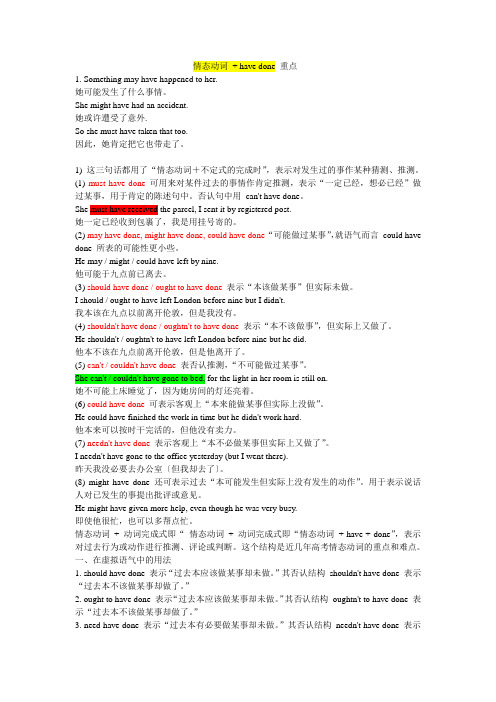
情态动词+ have done 重点1. Something may have happened to her.她可能发生了什么事情。
She might have had an accident.她或许遭受了意外.So she must have taken that too.因此,她肯定把它也带走了。
1) 这三句话都用了“情态动词+不定式的完成时”,表示对发生过的事作某种猜测、推测。
(1) must have done 可用来对某件过去的事情作肯定推测,表示“一定已经,想必已经”做过某事,用于肯定的陈述句中。
否认句中用can't have done。
She must have received the parcel, I sent it by registered post.她一定已经收到包裹了,我是用挂号寄的。
(2) may have done, might have done, could have done “可能做过某事”,就语气而言could have done 所表的可能性更小些。
He may / might / could have left by nine.他可能于九点前已离去。
(3) should have done / ought to have done表示“本该做某事”但实际未做。
I should / ought to have left London before nine but I didn't.我本该在九点以前离开伦敦,但是我没有。
(4) shouldn't have done / oughtn't to have done 表示“本不该做事”,但实际上又做了。
He shouldn't / oughtn't to have left London before nine but he did.他本不该在九点前离开伦敦,但是他离开了。
情态动词+have_done_结构

情态动词+have+done一、“must+have+done”表示对过去事情的肯定推测,译成“一定做过某事”,该结构只用于肯定句。
1. It must have rained last night, for the ground is wet.昨晚一定下雨了,因为地面还是湿的。
2. You must have been mad to speak to the servant.你和仆人说话,一定是发疯了。
二、“can't+have+done”表示对过去事情的否定推测,译成“不可能做过某事”。
1. Mr. Smith can't have gone to Beijing, for I saw him in the library just now.史密斯先生不可能去北京了,我刚才还在图书馆见过他。
2. Mary can't have stolen your money. She has gone home.玛丽不可能偷你的钱,她回家去了。
三、“can+have+done”表示对过去行为的怀疑,用于疑问句,译成“可能做过……吗?”。
1. There is no light in the room. Can they have gone out?屋里没有灯,他们可能出去了吗?2. There is nowhere to find them. Where can they have gone?到处找不到他们,他们可能到什么地方去呢?四、“could+have+done”是虚拟语气,表示对过去事情的假设,意思是本来能够做某事而没有做。
He could have passed the exam, but he was too careless. 本来他能够通过考试,但是他太粗心。
五、“may+have+done”表示对发生过的事情的推测,意思是“可能已经”或“也许已经”,用于肯定句中。
- 1、下载文档前请自行甄别文档内容的完整性,平台不提供额外的编辑、内容补充、找答案等附加服务。
- 2、"仅部分预览"的文档,不可在线预览部分如存在完整性等问题,可反馈申请退款(可完整预览的文档不适用该条件!)。
- 3、如文档侵犯您的权益,请联系客服反馈,我们会尽快为您处理(人工客服工作时间:9:00-18:30)。
完成句子中的“情态动词+have,done”
热点1:musthavedone表示对过去的肯定推测。
意为“过去一定做了某事”。
例1It__________(一定是)
Tomthatparkedthecarhere,asheistheonlyonewithacar.uldn’thavewastedtimeonhim,Isuppose.(think)
Keys:1.musthavebeen
2.musthavepassed
3.musthavethought
热点2:can/couldhavedone表示对过去的疑问和否定推测。
即:can/could...havedone?意为“过去可能做了某事吗?”
can/couldnothavedone意为“过去不可能做了某事”。
例4Mymp4playerisn’tinmybag.__________
(我可能把它放在什幺地方)?(put)
例5—Hasthemanagerleft?
—He__________(不可能离
开),becausehiscarisstillintheparkinglot.(leave)例6It’ssaidthattheyhaveswumtotheislandfromthecontinent,butthey___ _______(不可能做到)becausetheoceaninbetweenistoowide.
Keys:1.may/mighthavelostit
2.mighthaveputitinthewrongplace
热点4:“情态动词+havedone”表示虚拟。
(1)couldhavedone表示虚拟,用于肯定句。
意为“过去本来能够做某事(实际上未做)”。
例9Hedidnotregretsayingwhathedidbutfeltthathe__________
(本可以表述)itdifferently.(express)
例10Thankyouforallyourhardworklastweek.Idon’
tthinkwe__________(能够完成)itwithoutyou.(manage)Keys:1.couldhaveexpressed
2.couldhavemanaged
(2)should/oughttohavedone表示虚拟,用于肯定句和否定句。
即:should/oughttohavedone意为“过去本应该做某事
2.Theroadoutsideiswet.It__________
(准是一直在下雨)lastnight.(rain)
3.ItispossiblethattheKingofStonehengewaslinkedtothestones:h e____________________(可能参与)
inplanningthemonument,orinhelpingtransportandpullupthestone s.。
